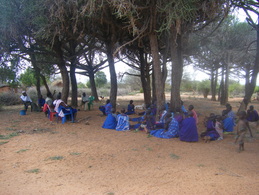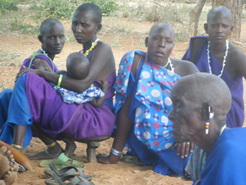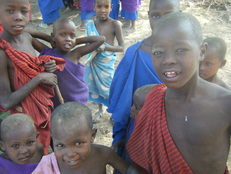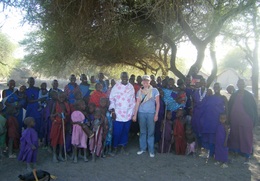 3 languages were spoken: Maasai, Swahili and English
3 languages were spoken: Maasai, Swahili and English The meeting focused on the severe water scarcity currently faced by the Maasai community of this area which includes 27 sub-villages (the so-called “bomas”), for an estimated total of 700-1,000 people (the number is not accurate, as the Maasai are a nomadic tribe: men are mainly shepherds or cattle-keepers and most of them come back home during the rainy season only).

Their current water source is Pangani river, about 8 km far from their homes. It goes without saying that the quality of this water is very poor, as this river rises from Kilimanjaro mountain (to flow into the Indian Ocean) and, before reaching them, it goes through many other villages which use it for many activities: farming, laundry, body cleansing, etc., therefore it gets more and more polluted along its flow.
The most suffering from this water accessibility problem and struggling for survival are women, as they are the hard-workers in their families. Indeed, fetching water daily is one the most common women’s activities in Maasai tribes, along with building houses and collecting firewood. Sometimes donkeys are used to transport water. One donkey can carry around 60 liters but, as its pace is slower than humans, it may take up to one day to go to the river and come back (around 5-6 hours one-way).

Should not the women find donkeys, they carry 10/20 liters on their back and, in this case, the water will only be used for cooking and it won’t be enough for all family members.
The water is not used for personal hygiene or laundry, as these activities take place at the riverside.
This activity is highly time and energy-consuming for women, who must also take care of their families and homes.

KIHO will be the spokesperson of their distress and intends to write a grant proposal for a new borehole drilling and a gravity pipeline construction in this area (without then the need of an energy-wasting pump), hoping to make a huge difference for hundreds of people.
 RSS Feed
RSS Feed
